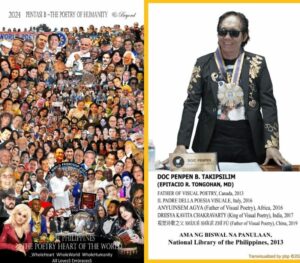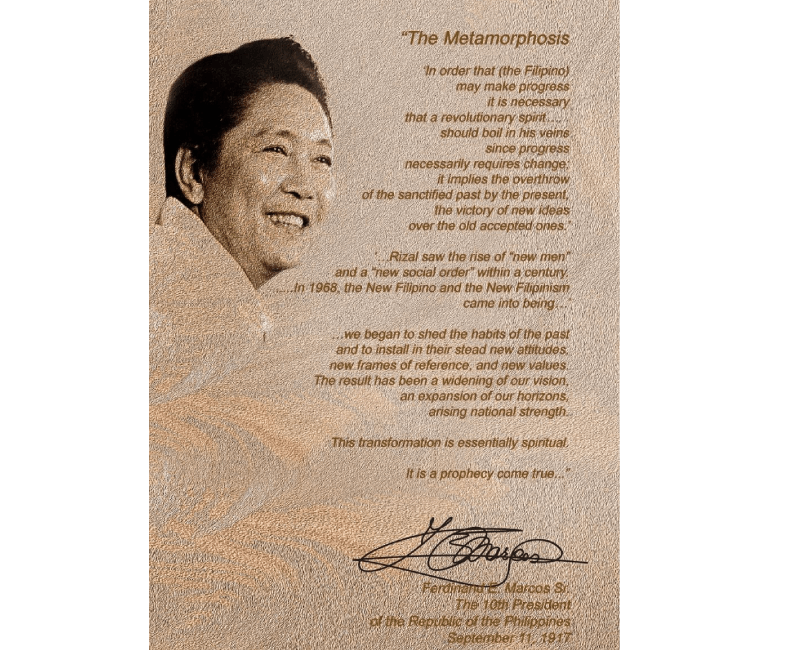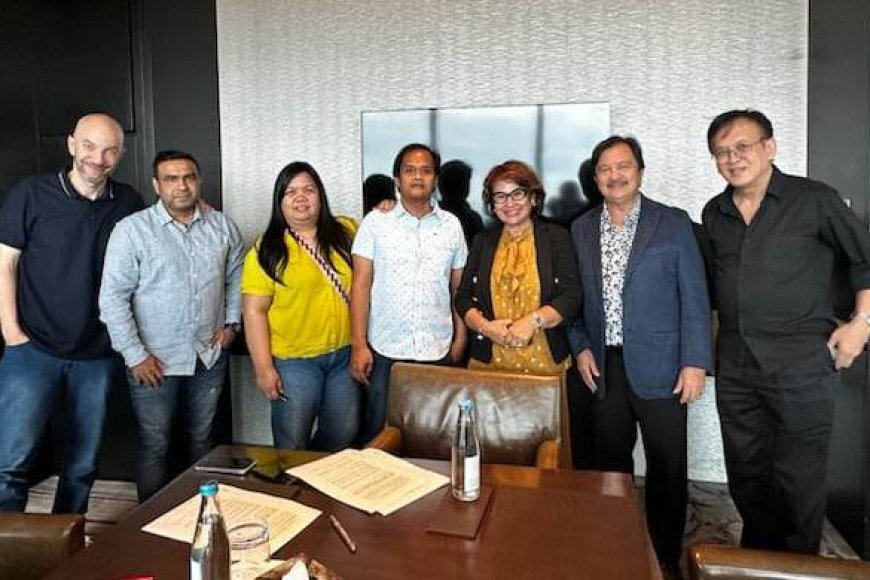Doc Penpen as National Artist in Literature for 2025: ‘Long overdue’ recognition, says ex-KWF chair
An excerpt from the article of Poet Laureate Danny Gallardo ____________________________________________________ The visions of three “great” men about Doc PenPen and the making of the Philippines as the “Poetry Heart of the World” The vision of William Shakespeare The discovery of the Philippines by Ferdinand Magellan over 500 years ago marked a pivotal moment in […]

An excerpt from the article of Poet Laureate Danny Gallardo
____________________________________________________
The visions of three “great” men about Doc PenPen and the making of the Philippines as the “Poetry Heart of the World”
The vision of William Shakespeare
The discovery of the Philippines by Ferdinand Magellan over 500 years ago marked a pivotal moment in history. Seventy-seven years later, according to Danny Gallardo, William Shakespeare—England’s great poet—prophesied in Sonnet 7 about a land in the “Orient.” Shakespeare’s words, some believe, may allude to the Philippines.
While Magellan’s voyage ended in the Philippines, it symbolized the start of a new kind of journey: the global spread of poetry. Leading this poetic circumnavigation is the “fair youth” Shakespeare referred to, identified by Gallardo as Dr. Epitacio Tongohan MD, also known as Doc PenPen Bugtong Takipsilim.
Starting in 2010, Doc PenPen has traveled the world—from Manila to Antarctica (through Dr. Lanka Siva Prasad)—carrying a vision of unity and love with the mantra “no colors, no races, all colors, all races, all loves, embraces.” His mission, “to heal, to inspire, and to awaken,” underpins the Pentasi B World Friendship Poetry movement he founded.

The vision of Dr. Jose Rizal
In his time, when there seemed little hope of Philippine freedom and progress, Jose Rizal (1861-1896) saw that a new Philippines was inevitable. But to hasten that day, he prescribed a positive break with the past.
He called on his countrymen to redeem themselves from a reputation for indolence, to acquire a new spirit for work, and to foster a new Filipino consciousness. There was no doubt in his mind about the requirements of progress: “In order that (the Filipino) may make progress, it is necessary that a revolutionary spirit, so to speak, should boil in his veins since progress necessarily requires change; it implies the overthrow of the sanctified past by the present, the victory of new ideas over the old accepted ones.”
This vision is worthy of aligning with the pioneering spirit of Doc PenPen’s democratization of poetry and creation of avant-garde poetry known as Pentasi B Poetry’s 5Ms concept: multilingual, multimodal, multiangular, multisensorial and multidimensional.
In the 1890s, Rizal saw the rise of “new men” and a “new social order” within a century. In 1968, the New Filipino and the New Filipinism came into being.

The vision of Ferdinand Marcos Sr.
In his fourth State of the Nation Address (SONA) in 1969, former President Ferdinand Marcos Sr., father of the incumbent President Ferdinand Marcos Jr., envisioned a Metamorphosis and New Filipinism. Here is an excerpt from his 4th SONA:
“I shall describe more thoroughly our achievements last year in the next section of this report. Altogether, they signify both an end and a beginning. The year 1968 saw the end of frustration, resignation, cynicism, and indolence, of complacency, and of indifference—the chief obstacles to Philippine progress. On the other hand, the past year marked the beginning of purposive, concerted action for national progress—the beginning of our national metamorphosis. For in 1968, we began to shed the habits of the past and to install in their stead new attitudes, new frames of reference and new values. The result has been a widening of our vision, an expansion of our horizons, arising national strength. This transformation is essentially spiritual. It is a prophecy come true.”
In the 1890s, Rizal saw the rise of “new men” and a “new social order” within a century. In 1968, the New Filipino and the New Filipinism came into being.

The heart of metamorphosis
In a roaring declaration, Doc PenPen’s “yesssSSS!” boils and ripples across the literary landscape. Pentasi B’s unique, “liberamorphic” and “therapeunigmatic” poetry symbolizes the enduring legacy of humanity in the rapidly advancing world of AI, which is increasingly felt and observed as it takes over across all frontiers of life.
His works characterize “legahuman,” solidified by numerous prestigious national and international awards, exemplifying a life dedicated to the transformation of humanity through poetry. The distinctions of honors and respect from his peers as the “Father and King of Visual Poetry” have sealed his name globally, marking the Philippines’ pivotal role in literature and the arts.
Doc PenPen’s achievements stand as a testament to his poetic leadership, bringing to life the prophecies and aspirations of William Shakespeare, Dr. Jose Rizal, and Ferdinand Marcos Sr., aligned with visions of these three great men making the Philippines as the “Poetry Heart of the World.”
Major awards and recognitions for Doc PenPen


— Joe Lad Santos
About the Contributor: Jose Laderas Santos, also known as Joe Lad Santos, has done laborious research about the works of Doc PenPen.
Prof. Jose Laderas Santos is a former chair of the Komisyon sa Wikang Filipino and the National Commission for Culture and the Arts. He is also a past president of FAMAS and a former board member of the National Museum, as well as a former director of the MTRCB.
Spotlight is BusinessWorld’s sponsored section that allows advertisers to amplify their brand and connect with BusinessWorld’s audience by publishing their stories on the BusinessWorld Web site. For more information, send an email to online@bworldonline.com.
Join us on Viber at https://bit.ly/3hv6bLA to get more updates and subscribe to BusinessWorld’s titles and get exclusive content through www.bworld-x.com.























